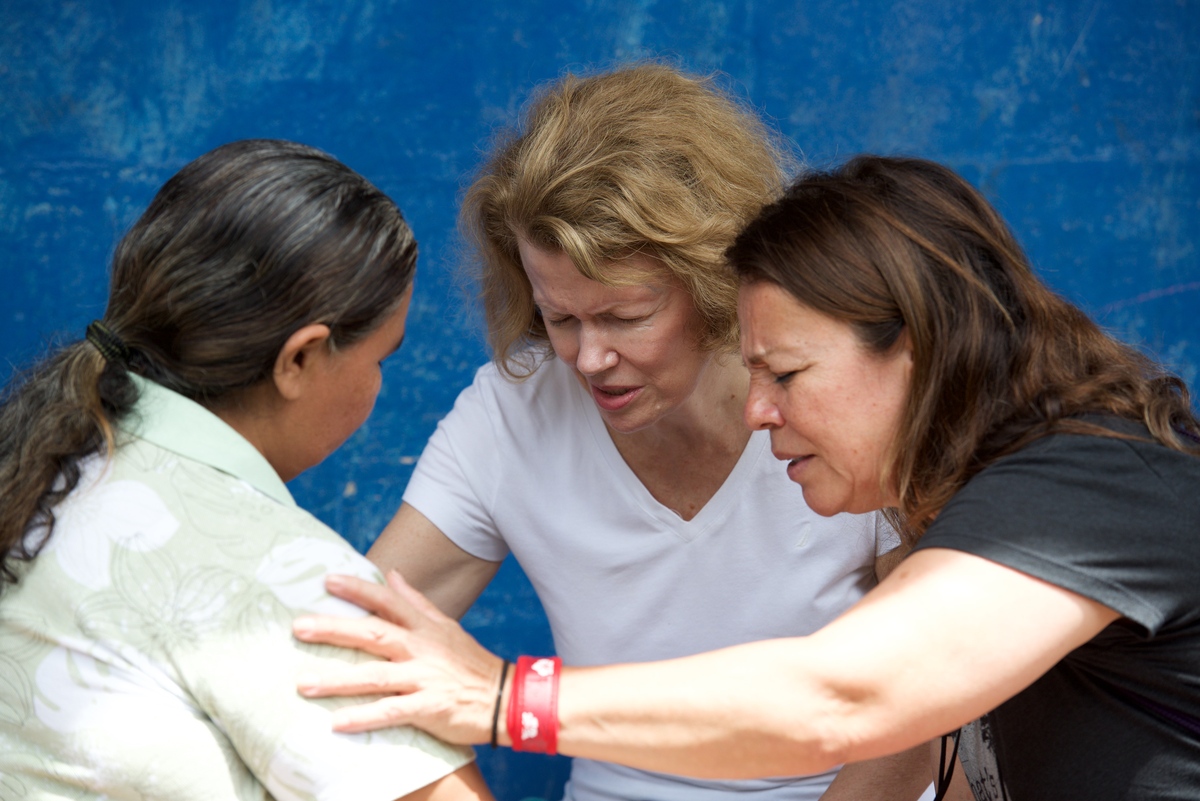El Refugio: Protegiendo a los vulnerables en Panamá
América LatinaTara Kenyon, misionera de Misiones Mundiales de las Asambleas de Dios (AGWM) en Panamá, recientemente nombrada Directora del Área de Centroamérica, ha estado involucrada en el ministerio toda su vida. «Crecí en la iglesia local participando en el movimiento misionero estudiantil, donde teníamos clubes bíblicos en nuestros campus. Eso era lo que hacías si eras un adolescente cristiano en los años 90», dijo Tara. El ministerio de jóvenes también formó parte de la vida de su esposo, Gerritt. Habiendo crecido como hijo de pastor, él y Tara se conocieron sirviendo como líderes juveniles en una Iglesia local mientras asistían a la Universidad North Central (NCU).
Individualmente, Dios había puesto un llamado a las misiones en el corazón de Tara y de Gerritt. Después de servir en el ministerio a los jóvenes en El Salvador, el liderazgo de AGWM les pidió que viajaran a Panamá para establecer y facilitar el ministerio a los estudiantes en ese país.
Durante su primer año de ministerio en Panamá, los Kenyon comenzaron a organizar asambleas escolares y a predicar la Palabra de Dios. Una asamblea escolar con más de 200 estudiantes se destacó. Antes de que comenzara la asamblea, Gerritt enseñó a los estudiantes a orar por los demás y a creer en el poder transformador del Señor a través de la oración. Durante el llamado al altar, hubo un mover del Espíritu Santo. «Fue desde el fondo del salón hacia el frente. Un niño alto se acercó al centro del salón para caminar al frente, y simplemente se arrodilló y lloró. En cuanto eso sucedió, todos en el salón comenzaron a llorar», relató Tara. Esta conmoción del Espíritu movió los corazones de los estudiantes. Los estudiantes abrazaron a sus compañeros y lloraron y oraron juntos.
Mientras el poder del Espíritu Santo conmovía a los estudiantes hasta las lágrimas, un grupo de chicas panameñas acercó a Tara a su grupo. Querían que hablara con una amiga que no lloraba. «Esta chica me contó la historia más horrible que jamás haya escuchado. Me quedé sin palabras. Probablemente me quedé boquiabierta; estaba fría, endurecida por el horror de lo que había passado». Mientras Tara intentaba guiarla a un lugar de sanidad, el Espíritu la impulsó a orar palabras específicas por la chica. «Esta pequeña niña desmoronada, cuya humanidad le había sido arrebatada, comenzó a quebrarse y cayó en mis brazos. Lloramos, y en ese momento pensé: “No. No más. No. Ya es suficiente”».
Tras el encuentro con la niña, Tara buscó privacidad tras una gran cortina y se postró ante el Señor. «Acabo de clamar a Dios. ¿Para esto nos trajiste? ¿Bromeas? Esto es demasiado grande. ¿Qué podemos hacer con esto?». Unos momentos después, Gerritt encontró a Tara tras la cortina y la miró fijamente. Ninguno habló; ambos acababan de experimentar el mismo horror. Fue entonces cuando los Kenyon decidieron que ya era suficiente.
En sus asambleas, los Kenyon descubrieron que, a pesar del abuso en las escuelas, la escuela era un lugar seguro para muchos niños. Los niños son más vulnerables antes y después de la escuela, cuando los depredadores tienen mayor acceso debido a que sus familiares trabajan o viajan. «Si sufren violencia doméstica en sus hogares, o si un padre tiene problemas con el abuso de sustancias, la escuela se convierte en un lugar seguro. La escuela es un lugar óptimo y familiar donde podemos ministrar el evangelio a los estudiantes», explicó Tara.
El horario escolar en Panamá es atípico, con dos o tres bloques de clases diferentes durante el día. Un mismo edificio escolar suele albergar a dos o tres grupos estudiantiles completamente diferentes. Tara y Gerritt sabían que necesitarían un espacio físico seguro para los estudiantes, independientemente del horario escolar.
Los Kenyon comenzaron a investigar sobre la trata de personas y la explotación sexual infantil. Buscando el consejo de profesionales con formación en el tema, los Kenyon decidieron enfocar sus esfuerzos en la prevención, visitando las escuelas, brindando recursos a los estudiantes y conversando sobre su valor como imagen de Dios. «Aquí es donde se obtiene el máximo provecho de la inversión, el máximo valor por el tiempo invertido. Se impactará más vidas en estas oportunidades para grandes multitudes», señaló Tara.
Para fomentar un espacio seguro para proclamar el evangelio, en 2016 los Kenyon crearon un ministerio extraescolar llamado El Refugio. Aquí, los estudiantes pueden estudiar, hacer sus tareas y conectar con otros estudiantes en un ambiente seguro y protegido. El número de estudiantes que visitan El Refugio es variable, con un promedio de entre 20 y 55 estudiantes a lo largo del día. Los estudiantes de El Refugio pueden acceder a los numerosos recursos que ofrece, como computadoras, impresoras, materiales para manualidades y proyectos.
El Refugio cuenta con dos empleados a tiempo completo, y Tara y Gerritt se desplazan por el centro según les sea posible. Normalmente, El Refugio cuenta con cinco o siete voluntarios que ayudan. Los estudiantes también colaboran. «Algunos estudiantes con más experiencia forman parte del lugar. Les hemos enseñado a ser acogedores, así que acogen a los nuevos estudiantes; se sienten dueños del lugar. Lo cuidan con esmero y, como si fueran voluntarios o personal, dan la bienvenida a los recién llegados. Es una excelente manera de que las cosas funcionen de forma orgánica y autóctona para poder seguir adelante», dijo Tara.
El Refugio graduó recientemente a su primera generación de estudiantes, quienes comenzaron a asistir a principios de la secundaria. «Pienso en cómo fueron impactadas esas vidas, en el camino que seguían cuando llegaron a nosotros. No todos se han decidido por Cristo, pero muchos sí y ahora forman parte de nuestro equipo de discipulado», dijo Tara. A medida que El Refugio crece, se beneficia de la ayuda de los voluntarios panameños. Sin embargo, los Kenyon aún necesitan apoyo misionero para ayudar a los jóvenes de Panamá. «[Llegar a los jóvenes] todavía no es una prioridad en una iglesia promedio aquí en Panamá, pero estamos haciendo todo lo posible para discipular a otros panameños para que continúen la obra, tengan un corazón para los jóvenes y vean esto como un ministerio al que dedicar su vida... eso es lo que pedimos en oración que el Señor haga en los próximos años», dijo Tara.
Al reflexionar sobre las continuas necesidades espirituales de Panamá, Tara enfatiza la importancia de que los obreros y misioneros vengan a Panamá a servir. Muchos misioneros fieles han servido en Panamá a lo largo de los años. Aun así, Panamá necesita nuevos obreros para recoger la cosecha. «Queremos ver que parte de ese buen trabajo se transfiera a nuevas vidas que inviertan en áreas específicas de oportunidad. Eso resonaría de forma genuina en Panamá», dijo Tara.
Por Holly A.V. Knapp






















